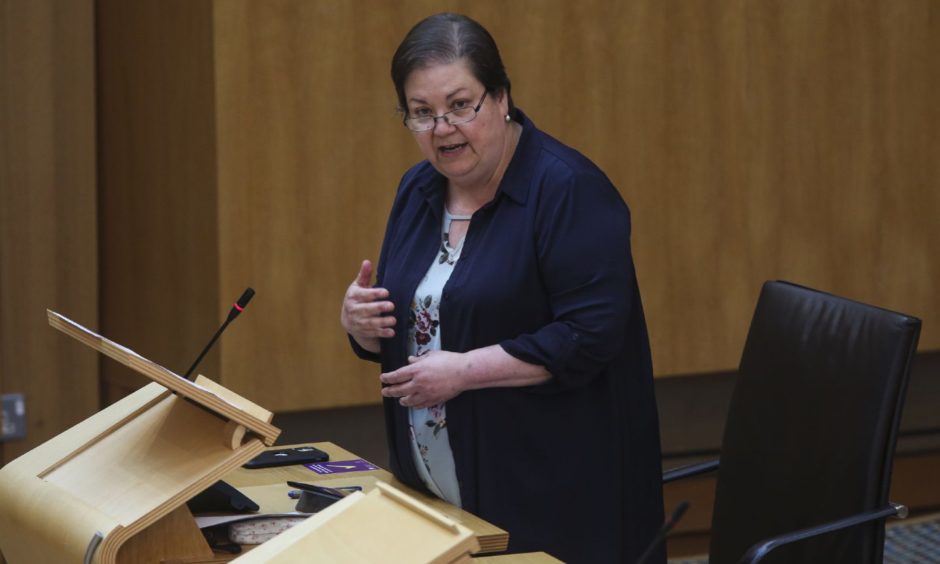The Scottish Government has been urged to take action to catch up on delayed cervical cancer screenings, with waits of up to six months.
Pressure is mounting on ministers to deal with the screening backlog, after it also emerged women are facing longer waits to access treatment following a smear.
The screening programme has already fallen under the spotlight in recent weeks after it was revealed that one woman had died after being wrongly excluded.
Opposition MSPs have called for the government to take urgent action to clear the backlog, saying a “ticking time bomb” awaits.
Smear tests were paused at the start of the pandemic as the NHS rallied to deal with the Covid-19 pandemic.
The programme restarted in a staged manner last July with those requiring more frequent smears receiving an invitation to make an appointment.
From September, routine screening began again for everyone else included on the programme.
However as a result of the pause those requiring routine screening face a six-month delay in getting an appointment, with NHS bosses saying there is “insufficient capacity” to completely catch up with the backlog.
‘Ticking time bomb’
Scottish Labour’s health spokeswoman Jackie Baillie said cancer services are “falling short” and accused the SNP of failing to understand the “urgency of the situation”.
She said: “Early diagnoses is the point of mass screening, and these delays undermine that. There are also delays in treatment.
“The cancer backlog is a ticking time bomb but there needs to be a greater sense of urgency from the government.
“Business as usual will not do – we need action to catch up with missed screenings.”
New figures released earlier this week revealed there was also a significant decrease in the number of cervical cancer patients receiving treatment on time.
A total of 72.2% of referrals started treatment within 62 days of referral between January and March, a decrease from 88.9% in the previous quarter.
This follows the Scottish Government’s announcement on the final day of the parliamentary term that hundreds of women have been wrongly excluded from the cervical screening programme.
Public Health Minister Maree Todd said a “seriously adverse event” in Scotland’s cervical cancer screening programme resulted in around 430 women being incorrectly told they did not need checked over the last 24 years.
Annie Wells, Scottish Conservative health spokeswoman, described the potential six-month wait as “very concerning” and said women should be seen “as soon as possible”.
She said SNP ministers “must take control of the situation and ensure NHS health boards have the resources necessary to clear the backlog in appointments”.
Ms Wells added: “Women who are already anxious as a result of the failures in the cervical cancer programme must be reassured that every effort is being made to support them and avoid any further delays.”
‘Insufficient capacity’
Dr Tasmin Sommerfield, consultant in public health medicine for national screening programmes within NHS National Services Scotland (NSS), said there is “insufficient capacity to completely catch up with the backlog of individuals on the routine screening pathway”.
She added: “The national programme recommenced six months after the pause and as such everyone is being invited six months later than would have been the case had Covid-19 not emerged.
“The programme will continue to monitor this and look for opportunities to increase capacity.”
The cervical screening test (smear test) is a free health check for women between 25 and 64.
It is not a test for cancer but checks for a virus called HPV which is the main cause of cervical cancer.
In March 2020, HPV testing was introduced into the cervical screening programme in Scotland.
Women who do not have the virus will therefore be invited for a cervical screening test every five years instead of every three years.
However, those who received their last smear test prior to the roll-out of the new HPV test would still be required to attend for a screening after three years to be checked.
Look out for symptoms
An NHS Grampian spokesman confirmed the pause in screening during the Covid-19 pandemic meant there “could be a delay of up to six months” in invitations being sent out.
He added: “It remains vitally important that women who experience symptoms, for example, bleeding after sex, between periods or after the menopause, or unusual discharge, should contact their GP practice to discuss these symptoms and not wait to be invited for a cervical screening appointment.”
A spokeswoman for NHS Tayside said the health board received £83,475 to provide additional cervical screening appointments in GP practices across Tayside, leading to 4,100 additional appointments.
She added: “Cervical screening plays a key role in preventing cervical cancer, by picking up signs of early cell changes before symptoms have a chance to develop.
“We would urge anyone who receives an invite to attend a cervical screen to arrange an appointment with their GP practice.”
A Scottish Government spokeswoman also said: “In line with expert recommendations, those whose previous test results indicated they needed more frequent cervical screening were prompted to make appointments last summer.
“The backlog for this group was cleared by the end of August and invitations for screenings have returned to pre-Covid rates.
“While measures to control coronavirus continue to pose capacity challenges, we are working closely with National Services Scotland and NHS boards, and all cancer screening programmes have offered routine screening since October.
“In 2020, we provided nearly £1 million to the cervical screening programme to support capacity and asked GPs to prioritise cancer screening during the recovery phase.
“Anyone who has symptoms of cervical cancer should not wait for their next screening appointment, but should contact their GP practice.
“Practices are still open to patients, and it’s important to seek help if you’re worried.”


